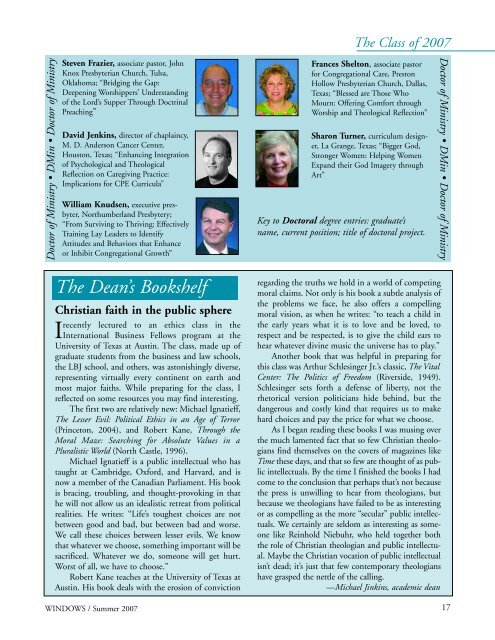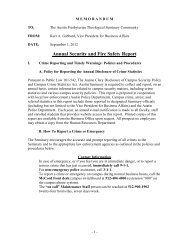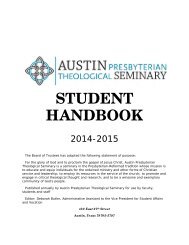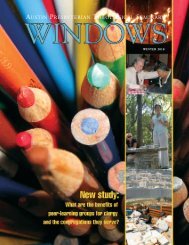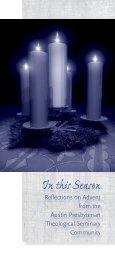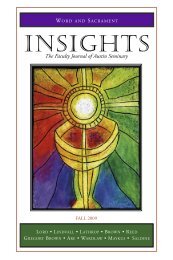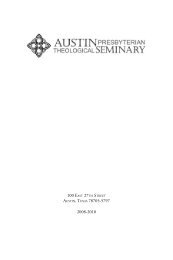AUSTIN PRESBYTERIAN THEOLOGICAL SEMINARY
windows summer 07 - Austin Presbyterian Theological Seminary
windows summer 07 - Austin Presbyterian Theological Seminary
- No tags were found...
Create successful ePaper yourself
Turn your PDF publications into a flip-book with our unique Google optimized e-Paper software.
The Class of 2007<br />
Doctor of Ministry • DMin • Doctor of Ministry<br />
Steven Frazier, associate pastor, John<br />
Knox Presbyterian Church, Tulsa,<br />
Oklahoma; “Bridging the Gap:<br />
Deepening Worshippers’ Understanding<br />
of the Lord’s Supper Through Doctrinal<br />
Preaching”<br />
David Jenkins, director of chaplaincy,<br />
M. D. Anderson Cancer Center,<br />
Houston, Texas; “Enhancing Integration<br />
of Psychological and Theological<br />
Reflection on Caregiving Practice:<br />
Implications for CPE Curricula”<br />
William Knudsen, executive presbyter,<br />
Northumberland Presbytery;<br />
“From Surviving to Thriving: Effectively<br />
Training Lay Leaders to Identify<br />
Attitudes and Behaviors that Enhance<br />
or Inhibit Congregational Growth”<br />
Frances Shelton, associate pastor<br />
for Congregational Care, Preston<br />
Hollow Presbyterian Church, Dallas,<br />
Texas; “Blessed are Those Who<br />
Mourn: Offering Comfort through<br />
Worship and Theological Reflection”<br />
Sharon Turner, curriculum designer,<br />
La Grange, Texas; “Bigger God,<br />
Stronger Women: Helping Women<br />
Expand their God Imagery through<br />
Art”<br />
Key to Doctoral degree entries: graduate’s<br />
name, current position; title of doctoral project.<br />
Doctor of Ministry • DMin • Doctor of Ministry<br />
The Dean’s Bookshelf<br />
Christian faith in the public sphere<br />
Irecently lectured to an ethics class in the<br />
International Business Fellows program at the<br />
University of Texas at Austin. The class, made up of<br />
graduate students from the business and law schools,<br />
the LBJ school, and others, was astonishingly diverse,<br />
representing virtually every continent on earth and<br />
most major faiths. While preparing for the class, I<br />
reflected on some resources you may find interesting.<br />
The first two are relatively new: Michael Ignatieff,<br />
The Lesser Evil: Political Ethics in an Age of Terror<br />
(Princeton, 2004), and Robert Kane, Through the<br />
Moral Maze: Searching for Absolute Values in a<br />
Pluralistic World (North Castle, 1996).<br />
Michael Ignatieff is a public intellectual who has<br />
taught at Cambridge, Oxford, and Harvard, and is<br />
now a member of the Canadian Parliament. His book<br />
is bracing, troubling, and thought-provoking in that<br />
he will not allow us an idealistic retreat from political<br />
realities. He writes: “Life’s toughest choices are not<br />
between good and bad, but between bad and worse.<br />
We call these choices between lesser evils. We know<br />
that whatever we choose, something important will be<br />
sacrificed. Whatever we do, someone will get hurt.<br />
Worst of all, we have to choose.”<br />
Robert Kane teaches at the University of Texas at<br />
Austin. His book deals with the erosion of conviction<br />
regarding the truths we hold in a world of competing<br />
moral claims. Not only is his book a subtle analysis of<br />
the problems we face, he also offers a compelling<br />
moral vision, as when he writes: “to teach a child in<br />
the early years what it is to love and be loved, to<br />
respect and be respected, is to give the child ears to<br />
hear whatever divine music the universe has to play.”<br />
Another book that was helpful in preparing for<br />
this class was Arthur Schlesinger Jr.’s classic, The Vital<br />
Center: The Politics of Freedom (Riverside, 1949).<br />
Schlesinger sets forth a defense of liberty, not the<br />
rhetorical version politicians hide behind, but the<br />
dangerous and costly kind that requires us to make<br />
hard choices and pay the price for what we choose.<br />
As I began reading these books I was musing over<br />
the much lamented fact that so few Christian theologians<br />
find themselves on the covers of magazines like<br />
Time these days, and that so few are thought of as public<br />
intellectuals. By the time I finished the books I had<br />
come to the conclusion that perhaps that’s not because<br />
the press is unwilling to hear from theologians, but<br />
because we theologians have failed to be as interesting<br />
or as compelling as the more “secular” public intellectuals.<br />
We certainly are seldom as interesting as someone<br />
like Reinhold Niebuhr, who held together both<br />
the role of Christian theologian and public intellectual.<br />
Maybe the Christian vocation of public intellectual<br />
isn’t dead; it’s just that few contemporary theologians<br />
have grasped the nettle of the calling.<br />
—Michael Jinkins, academic dean<br />
WINDOWS / Summer 2007 17


